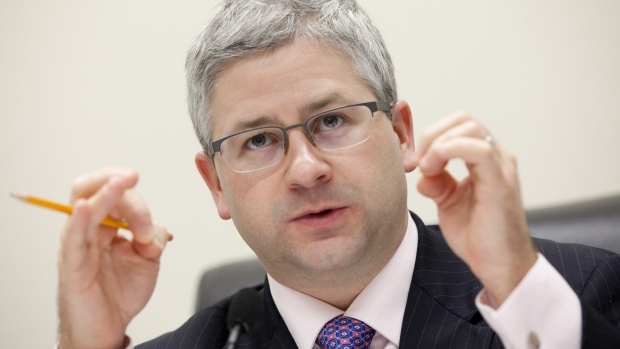
Banks Warn of Growing Energy-Related Risks in Mortgage Portfolios
Across Europe, banks are trying to figure out how to handle a growing risk lurking in residential mortgage portfolios: energy consumption.
Latest Videos
The information you requested is not available at this time, please check back again soon.

Across Europe, banks are trying to figure out how to handle a growing risk lurking in residential mortgage portfolios: energy consumption.

South Korea’s top financial watchdog attempted to revive optimism over the nation’s corporate reform initiatives to investors in New York while soothing concerns over the short-selling ban.

Inflation-related releases across the Group of Seven will prime central bankers for crucial June interest-rate decisions, just as they meet in Italy to discuss the state of the world economy.

Big US bond investors have been aggressively shifting money into long-dated notes, betting that the unloved asset class will be one of the winners from eventual interest rate cuts.

A measure of underlying US inflation cooled in April for the first time in six months, a small step in the right direction for Federal Reserve officials looking to start cutting interest rates this year.
Jan 24, 2019
, Bloomberg News

(Bloomberg) -- Deutsche Bank AG’s chief executive officer is being questioned by a key Republican lawmaker over what the company is doing to boost money-laundering safeguards amid reports that its U.S. unit may have been a key conduit for billions of dollars of dirty money.
Representative Patrick McHenry, the top Republican on the House Financial Services Committee, sent a letter Thursday to CEO Christian Sewing, requesting documents that would outline what internal and independent reviews have turned up about how the bank shields against illicit transactions. The North Carolina lawmaker joins prominent Democrats in looking into vulnerabilities at the Frankfurt-based lender, showing that scrutiny of scandals ranging from “mirror trading” to the river of suspicious cash from Denmark’s leading bank will be a bipartisan affair.
“It is critically important for the American public to have confidence Deutsche Bank is adequately addressing the vulnerabilities that allowed billions of dollars tied to criminal activities to move through the international banking system,” McHenry said in the letter, setting a Feb. 7 deadline for a response from the bank.
He noted that the Federal Reserve has also begun a probe of how Deutsche’s U.S. unit handled billions of dollars in tainted transactions from Danske Bank A/S, as Bloomberg reported Wednesday. That adds to the international authorities, including the U.S. Department of Justice, pursuing investigations on those interactions.
In that and other cases, the bank has launched internal reviews and been required to bring in outside firms to investigate its conduct and controls. McHenry requested that findings from those reviews be provided to the committee, even though the reports haven’t been made public.
“We remain committed to providing appropriate information to all authorized investigations,” the bank said Thursday in a statement responding to a request for comment.
Democratic Senators Elizabeth Warren of Massachusetts and Chris Van Hollen of Maryland last month urged Banking Committee Chairman Mike Crapo to probe the company’s correspondent banking business for vulnerabilities to money laundering.
The German lender has been sanctioned before by the Fed, it’s primary U.S. regulator. In 2017, the company agreed to pay $41 million to settle allegations its U.S. business failed to keep up sufficient money-laundering protections. The bank’s faulty monitoring involved billions of dollars in “potentially suspicious transactions” processed from 2011 through 2015, the Fed said, adding that the transactions involved affiliates in Europe that failed to provide “accurate and complete information.”
Representatives Maxine Waters of California, who leads the Financial Services Committee, and Adam Schiff, who leads the Intelligence panel, have said they’d jointly pursue information on the bank’s dealings with the real estate business of President Donald Trump. The bank acknowledged it received an inquiry from the two committees -- without providing details on what was requested -- and said the bank is in talks about trying “to determine the best and most appropriate way of assisting them in their official oversight functions.”
To contact the reporter on this story: Jesse Hamilton in Washington at jhamilton33@bloomberg.net
To contact the editors responsible for this story: Jesse Westbrook at jwestbrook1@bloomberg.net, Gregory Mott
©2019 Bloomberg L.P.